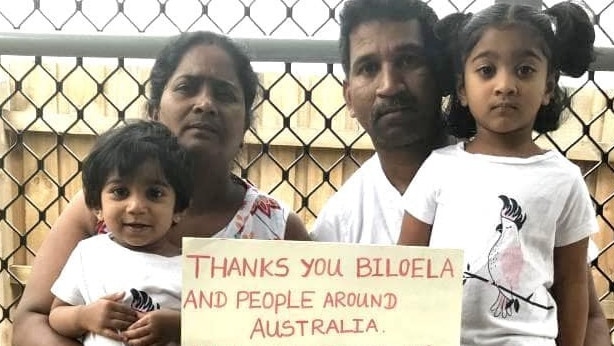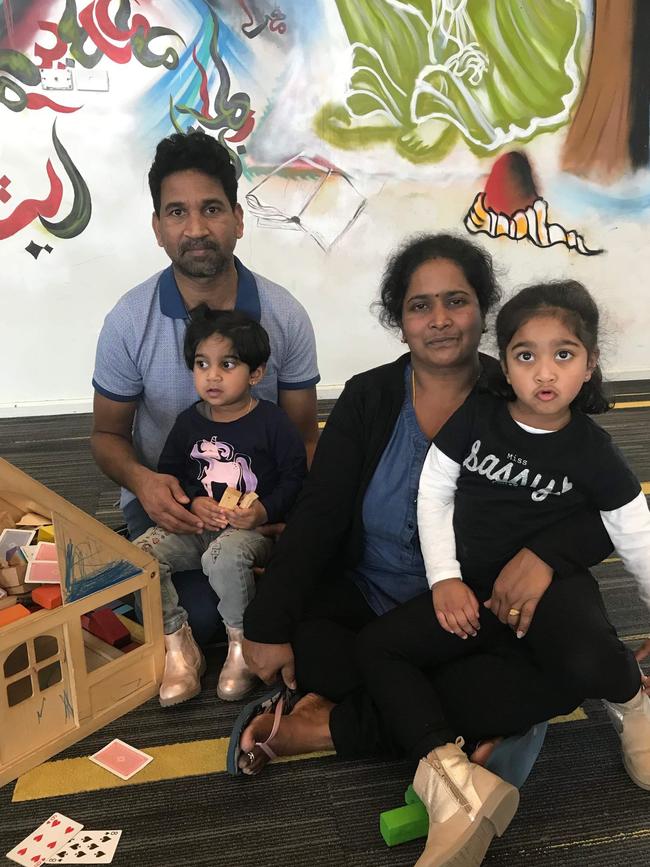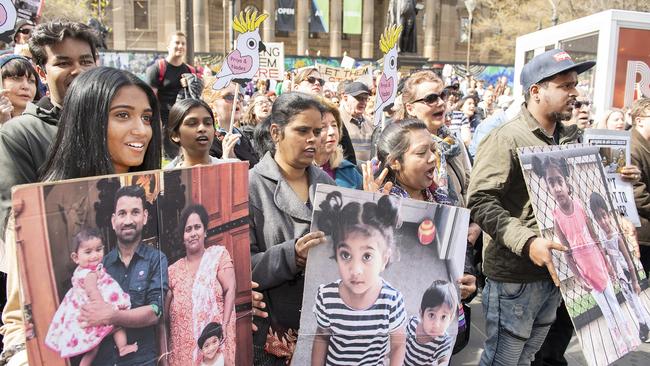No exceptions any more
Peter Dutton’s tough rhetoric on a Tamil family reflects his firm belief backdowns will be used by people-smugglers to sell tickets.

The poems of Janet Galbraith have been praised for their rare clarity, “as luminous as shards of coloured glass that score and cut as deep”.
When the acclaimed writer and humanitarian went behind the wire on Christmas Island in June 2014 to work with young asylum-seekers, she was confronted by escalating misery.
Three Somali teenagers picked up pieces of glass and began cutting themselves. Aged 16, 17 and 18, the girls had arrived by boat with no parent or guardian and were already in a psychological support program for struggling detainees. In hindsight, a literature workshop — even one with someone as kind and gifted as Galbraith — was never going to be an adequately-salving balm.
Those girls and others — Australians might be surprised to learn how many — were quietly moved off Christmas Island to the Australian mainland in apparent contravention of a boats policy badged “no exceptions”.
Special cases
The immigration minister who made those exceptions was Scott Morrison, now Australia’s Prime Minister. He was turning back boats and defending the detention of families on Nauru at the same time he was privately accepting expert advice that some vulnerable young detainees should be shifted to mainland Australia.
He was not the only one. A few months after Peter Dutton took over as immigration minister, he allowed a refugee boy who arrived by boat at Christmas Island in the first weeks of the Abbott government to leave Nauru for the Australian mainland. Dutton intervened on behalf of the Rohingyan boy, aged 17, whose parents were murdered in Myanmar, and gave him a visa.
MORE: Greg Sheridan — Asylum family’s plight presents a dilemma of biblical proportions | Labor split on PM’s faith | Geoff Chambers — Has Labor learnt nothing? | Editorial — Are they refugees? No
What makes these special cases particularly sensitive for the government is that each young person arrived by boat after July 19, 2013. That is the day Labor prime minister Kevin Rudd pulled up the drawbridge on any asylum-seeker who arrived by boat, even those found to be refugees.
They were told that on arrival they would never settle in Australia. They were told they would never see the mainland. The Coalition, elected in September 2013, adopted the policy and turbocharged it by intercepting asylum-seekers at sea, putting them in lifeboats and pointing them in the direction of Indonesia.
Before Rudd clampdown
The Tamil couple now embroiled in a deportation row — and controversially detained with their young children on Christmas Island — arrived during an earlier chapter of Australian boat policy.
Nadesalingam Murugappan reached Christmas Island by boat in 2012. Kokilapathmapriy Nadarasa, known as Priya, arrived at Cocos Islands on April 2, 2013 — a few months before Rudd’s emphatic declaration.
They were among more than 50,000 people who arrived by boat seeking asylum during the Rudd-Gillard years. In that time, an estimated 1200 people drowned on asylum boats trying to get to Australia. Labor scrambled for solutions to halt the people-smuggling trade. Gillard’s Malaysia people-swap was blocked in parliament. Rudd’s decision to put a freeze on the processing of asylum claims led to rolling tensions.
Detainees set the Christmas Island detention centre on fire and walked out en masse, forcing the Australian Federal Police to relieve government contractor Serco of its command for several days.
Living in limbo
Like many other asylum-seekers who arrived by boat in this chaotic period, Murugappan and Nadarasa were granted bridging visas to live on the mainland. They made a life together in a small Queensland town. They got married, had two children and made friends.
But they were living in limbo because they were repeatedly found not to be refugees.
Last December, as media attention put pressure on the government to allow the family to stay, Dutton only dug in.

“Australia is a good international citizen and does more than most to assist and resettle genuine refugees in need of protection,” the Home Affairs Minister said. “But there are many people who seek to take advantage of Australia and Australians.” Dutton was speaking on the day the Federal Circuit Court dismissed an appeal by the couple.
“It is the seventh time the courts have dismissed their appeals,” he said. “The matter has been taken to the High Court and rejected by this, the nation’s highest judicial forum.”
Backdown fears
Dutton’s tough rhetoric reflects his firm belief that backdowns will be used by people-smugglers to sell tickets on boats.
Because of this, refugee advocates are torn about the high profile of the family’s case. Some say they had no choice but to go public. Others say the more public their case becomes, the less likely Dutton is to make an exception.
He was certainly in no mood for it last December, when he issued his strident media release.
“So this family’s case has been comprehensively assessed over many years to the highest judicial level and they have been found not to be refugees,” he said.
“They are foreign nationals who paid people-smugglers to bring them to Australia illegally and have no legitimate reason to be granted visas to remain here.
“Their actions to subvert the due processes have taken years and come at great cost to the Australian taxpayer. If these people had any regard for the Australian community, they would accept the umpire’s decision and leave the country.”
Unlawful non-citizens
Murugappan first learned that Australia did not consider him a refugee in late 2012. In 2013, the Refugee Review Tribunal affirmed that decision.
That refusal was upheld by the Federal Magistrates Court in July 2014, then by the full Federal Court in November 2014.
The decision was upheld by the High Court in June 2015.
In 2016, Nadarasa learned from the Department of Immigration that Australia did not consider her a refugee. The Immigration Assessment Authority affirmed that refusal the following year.
This is when Dutton says the family subsequently became unlawful non-citizens “and should have departed the country”.
Authorities subsequently took them from their home in Biloela and put them in detention in Melbourne ahead of a planned deportation. “After agreeing to voluntarily leave the country, the family withdrew from that agreement and Ms Nadarasa then lodged further legal appeals,” Dutton claimed.
Two legal appeals failed. But last Thursday the family’s deportation was halted at the last minute — they were already on a government charter bound for Colombo — by the Federal Court.
Toddler stays
Judge Mordecai Bromberg granted an injunction preventing the removal of the youngest daughter from the country, which lasts until 4pm on Wednesday. This is because the two-year-old has never been individually assessed for a protection claim.
Under the Migration Act, Australian-born children of asylum-seekers who arrived by boat take on the visa status of their parents at the time.
That means neither Kopika, 4, or Tharunicaa, 2, are considered to be Australians.
It seems the family’s fate rests on whether or not Tharunicaa is found to be a refugee. The matter returns to the Federal Court on Wednesday.
In the meantime, the family has been shifted to Christmas Island. The decision to fly the family to the remote Australian territory enraged supporters.
Thousands rallied for them on Sunday. The family’s supporters from Home to Bilo took out an advertisement advocating for the family in the Biloela newspaper, the Central Telegraph. The group earlier put a billboard with a photograph of the family on it in Dutton’s electorate.
Response divided
Father’s Day, and 2GB broadcaster Alan Jones called on the government to let them stay. He pointed to the fact that Nadarasa had watched her former fiancee burnt to death.
“I find the government’s behaviour on this, and that of Peter Dutton, beyond disgraceful,” Jones said on air.
“I have written to the Prime Minister. There’s been no response. I was asking him for a bit of practical Christianity.”
Jones’s stablemate at 2GB, Ray Hadley, vehemently disagrees. Hadley told his listeners that Murugappan’s plea for asylum was dismissed in the Appeals Tribunal because he returned to Sri Lanka on three occasions during the civil war.

Furthermore, he said on air, there was no evidence to suggest the family was under threat in its home country.
“That’s one of many court decisions that illustrates that these people have told lies,” Hadley claimed. “If they’re not refugees, they’re not refugees.
“We can’t simply bend the rules because the group of people say they had two children here.”
Sticking to rules
The Coalition believes there is strong evidence about what happens when it is seen to “bend the rules”.
In 2014, after the three vulnerable Somali teenagers self-harmed at Christmas Island and were shifted to Sydney, there was a spate of minor self-harms and self-harm attempts by asylum-seekers at the same camp.
The girls were not given permanent protection visas to go to the mainland, but there was havoc when other detainees saw them on Facebook free and smiling.
Authorities on Christmas Island came to believe that the self-harms that followed were cynical attempts to follow the three young detainees into community detention in Sydney.
Australia is grappling with the Tamil family crisis at a time when there have never been more refugees.
The UN estimates that there are 70 million displaced people in the world, and 22 million of them are refugees.
Australia’s intake is capped at 18,750, which is one of the world’s highest intakes per head of population.
Compassion bind
The Australian has been told by insiders that the government is in a bind when it comes to showing compassion to the Tamil family.
If it does, it risks looking weak to smugglers who are ready to restart their trade. If it does not, it can be accused of cruelty.
Yesterday the Prime Minister was refusing to intervene.
“That’s not how you run strong borders,” he said.
“I do understand the real feeling about this and the desire for there to be an exception but I know what the consequences are of allowing those exceptions.
“I know what happens when you send those messages back into those communities, whether it’s in Sri Lanka or the more than 10,000 people sitting in Indonesia right now who would get on a boat tomorrow if they thought this government was changing its position.”


To join the conversation, please log in. Don't have an account? Register
Join the conversation, you are commenting as Logout